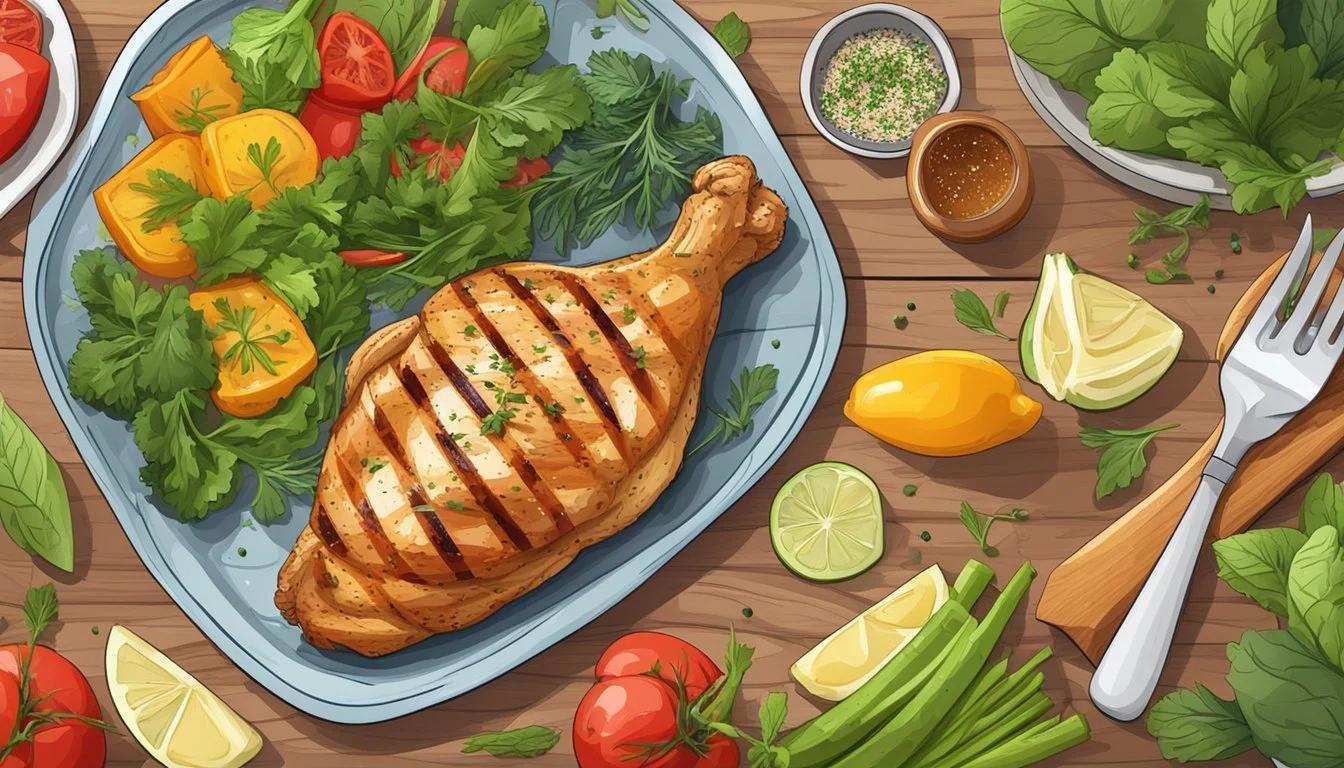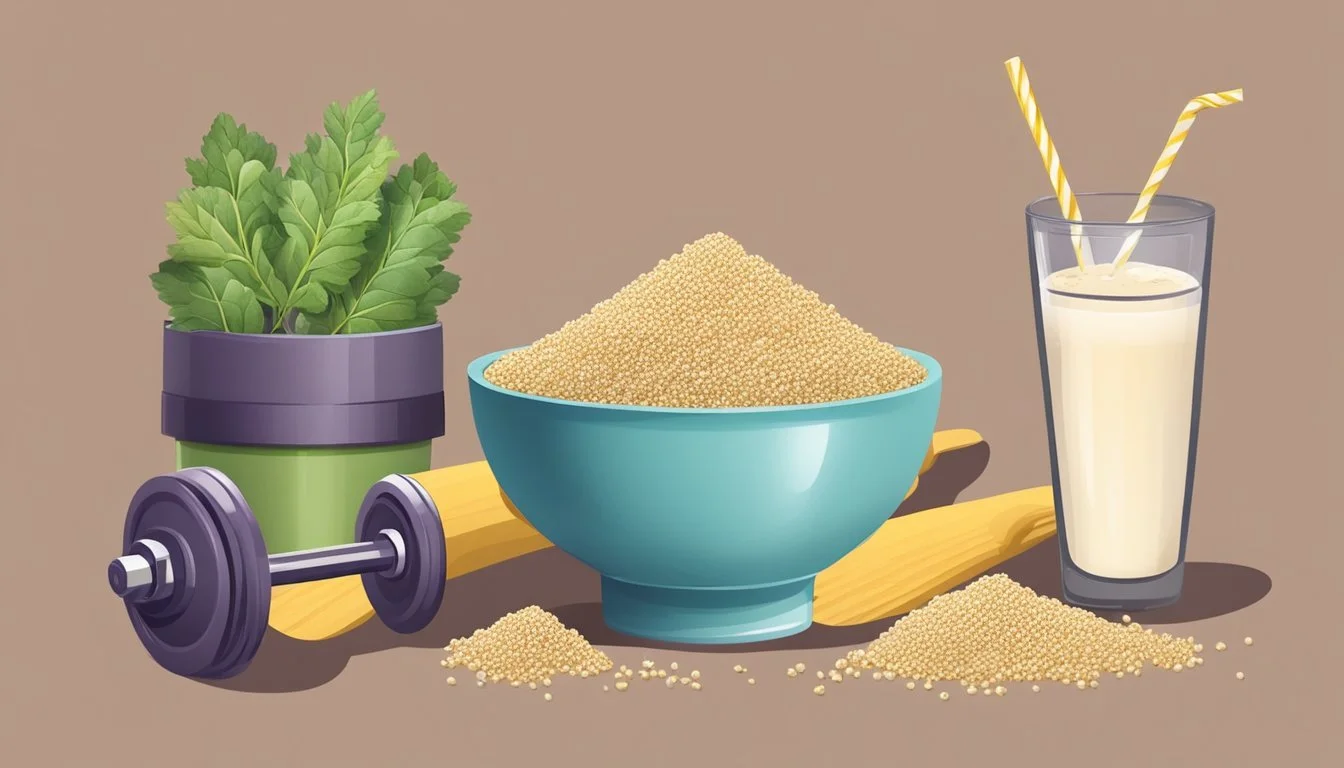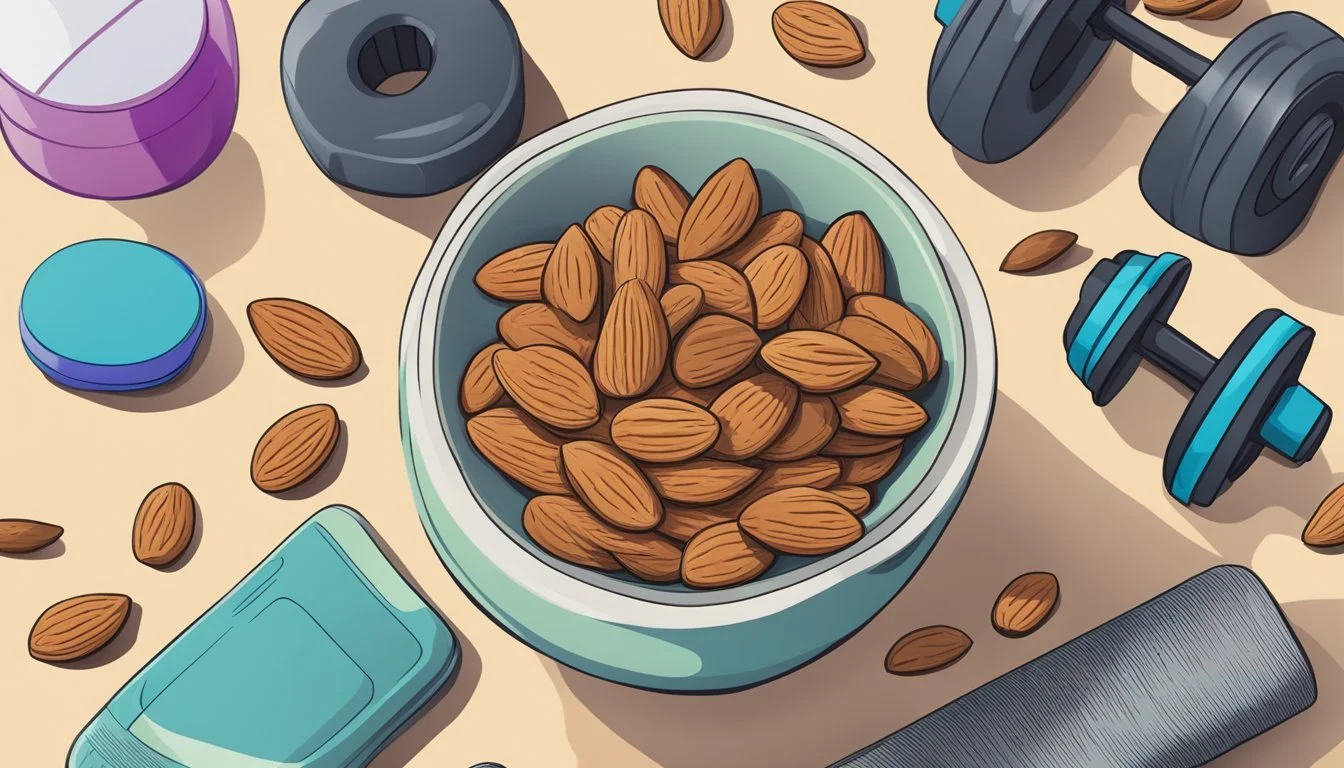Top Muscle-Building Foods: Fuel Your Growth and Strength
Building muscle efficiently requires not only a well-structured exercise regimen but also a strategic approach to nutrition. The foods consumed play a crucial role in supporting muscle growth and recovery. Knowing what to eat can optimize efforts in the gym and help achieve fitness goals more rapidly.
The right dietary choices can enhance muscle protein synthesis, providing the body with the necessary nutrients to repair and build muscle fibers. A balanced diet incorporating specific muscle-building foods ensures sustained energy levels and improved performance during workouts.
1) Grilled Chicken Breast
Grilled chicken breast is a popular choice for those looking to gain muscle due to its high protein content. A 100g serving of chicken breast provides about 31g of protein, which is essential for muscle repair and growth.
In addition to protein, grilled chicken breast is rich in vital nutrients. It contains B vitamins such as niacin, riboflavin, and vitamin B6, which support energy metabolism.
This lean meat also supplies essential amino acids, including leucine, which plays a key role in muscle protein synthesis. The presence of these nutrients makes grilled chicken breast an excellent component of a muscle-building diet.
Grilled chicken is also low in fat and carbohydrates, making it suitable for those aiming to build muscle without gaining excess weight. The typical nutritional profile includes 165 Kcals per 100g serving, making it a low-calorie yet nutrient-dense food.
Incorporating grilled chicken breast into meals post-workout can aid muscle recovery. Consuming it with a balanced diet of carbohydrates and healthy fats can provide comprehensive nutrition to fuel workouts and support muscle development.
2) Salmon
Salmon is an excellent choice for those looking to gain muscle. Rich in high-quality protein, a 3-ounce (85-gram) serving of salmon provides about 17 grams of protein, which is essential for muscle repair and growth.
This fatty fish is also packed with omega-3 fatty acids. Omega-3s have been shown to help reduce muscle loss and improve muscle function. This makes salmon a smart addition to a muscle-building diet.
Vitamin D and cholesterol found in salmon support overall health and hormone balance. Both are vital for muscle maintenance and growth. Including salmon in your diet can help ensure these nutrients are adequately supplied.
Salmon is versatile and can be prepared in various ways to suit different tastes and dietary preferences. Grilled, baked, or pan-seared salmon are all delicious options that contribute to muscle-building goals.
For athletes in the cutting phase, the satiating quality of salmon can help manage cravings. The protein and healthy fats in salmon make it a satisfying option that supports lean muscle maintenance.
3) Greek Yogurt
Greek yogurt is a popular food among those looking to build muscle due to its high protein content. It is a versatile option that can be easily incorporated into various meals and snacks.
Each serving of Greek yogurt provides a significant amount of protein, which is essential for muscle growth and repair. This makes it a valuable addition to a muscle-building diet.
Choosing low-fat or non-fat Greek yogurt helps manage overall calorie and fat intake. This is important for those who want to increase protein intake without adding excess fat that might affect body composition.
Greek yogurt can be consumed on its own or added to smoothies, salads, and other dishes. It also contains other beneficial nutrients such as calcium and probiotics, which support overall health.
4) Quinoa
Quinoa is widely regarded as a valuable food for those looking to gain muscle. This ancient grain contains a high level of protein, which is essential for muscle repair and growth.
Quinoa is particularly noted for its complete amino acid profile. It includes all nine essential amino acids, crucial for muscle synthesis. Among these, leucine stands out for its effectiveness in promoting muscle repair.
In addition to protein, quinoa provides fiber. Fiber aids in digestion and helps maintain steady energy levels, which is beneficial during intense workouts. One cup of cooked quinoa contains approximately 5 grams of fiber.
Quinoa's low calorie content makes it ideal for muscle gain without excessive fat accumulation. It fits well into various diet plans, including vegan and vegetarian diets, making it versatile for different dietary needs.
Incorporating quinoa into meals is simple. It can be added to salads, used as a base for bowls, or served alongside protein-rich dishes like grilled chicken or tofu. This makes it an easy addition to any meal plan focused on muscle building.
5) Egg Whites
Egg whites are a staple in many muscle-building diets due to their high protein content and low fat levels. Each large egg white contains about 3.5 to 5 grams of protein, which is crucial for muscle repair and growth.
Egg whites provide all the essential amino acids needed for effective muscle recovery. This ensures that the body has the necessary building blocks for repairing and building muscle tissue after workouts.
Many bodybuilders prefer egg whites because they are almost fat-free. This makes it easier to increase protein intake without adding extra fat to their diet. The low-calorie nature of egg whites also helps in maintaining a lean physique.
Egg whites are versatile and can be included in various meals. They can be scrambled, boiled, or even added to shakes. This flexibility makes them an easy addition to a muscle-gaining diet.
Another key benefit of egg whites is that they do not contain cholesterol, unlike egg yolks. This makes them a healthier option for those concerned about their cholesterol levels while still wanting to meet their protein needs.
6) Almonds
Almonds can be a powerful addition to any muscle-building diet. These nuts are packed with protein, which is essential for muscle repair and growth. A handful of almonds, approximately 23 nuts, provides about 6 grams of protein.
Beyond protein, almonds offer healthy fats, particularly monounsaturated fats. These fats support overall heart health and can help provide the energy needed for intense workouts.
Almonds are also rich in essential vitamins and minerals. They contain high levels of vitamin E, which acts as an antioxidant and helps protect muscle cells from damage during exercise.
In addition, almonds are a good source of magnesium, a mineral that plays a crucial role in muscle function and energy production. Proper magnesium intake can improve exercise performance and muscle recovery.
Manganese and copper found in almonds help combat oxidative stress, which can hinder muscle recovery and growth. Consuming these nuts regularly can contribute to more effective workout recovery.
Riboflavin, or vitamin B2, present in almonds, is important for energy production and can further support muscle-building efforts. This makes almonds not just a protein source, but also a supplier of nutrients aiding muscle metabolism.
Incorporating almonds into a balanced diet provides multiple nutritional benefits, making them a versatile snack for those looking to build muscle efficiently.
7) Lean Beef
Lean beef is a powerhouse for muscle building due to its high protein content and essential nutrients. A typical serving of lean beef, such as a sirloin or tenderloin, provides a significant amount of protein, which is crucial for repairing and building muscle tissues.
In addition to its protein content, lean beef is rich in vitamins and minerals, including iron and zinc. Iron helps in oxygen transport to muscles, enhancing performance and endurance. Zinc plays a vital role in protein synthesis and recovery, making it beneficial for those engaged in regular strength training.
Lean beef also contains creatine, a compound that supports energy production during high-intensity workouts. This can help in improving strength and power, which are important for muscle growth.
Moreover, lean beef is a source of healthy fats, including omega-3 fatty acids, which can reduce inflammation and support overall health. This makes it an excellent choice for those looking to build and maintain muscle mass while keeping their diet balanced and nutritious.
8) Tuna
Tuna is widely known for its high protein content, making it an excellent choice for those looking to gain muscle. A 3-ounce serving of tuna provides around 20-25 grams of protein, which plays a crucial role in muscle repair and growth.
Tuna is low in calories while offering a high ratio of protein to calories. This allows individuals to meet their protein needs without consuming excessive calories, which is beneficial for muscle-building and maintaining lean body mass.
In addition to its protein content, tuna is also a rich source of omega-3 fatty acids. These healthy fats contribute to reducing muscle loss and enhancing muscle function, making tuna a well-rounded option for muscle gain.
Furthermore, including tuna in your diet can diversify your sources of protein. This variety can prevent diet fatigue and ensure you get a range of nutrients essential for overall health.
Tuna is also convenient and versatile. It can be eaten canned, fresh, or cooked, and easily incorporated into salads, sandwiches, or even on its own. This flexibility makes it easy to include in various meal plans targeted at muscle building.
9) Cottage Cheese
Cottage cheese stands out as a muscle-building superfood due to its high protein content.
In one cup (about 240 grams) of cottage cheese, there are approximately 28 grams of protein. This rich protein source aids in muscle repair and growth, making it a favored choice for athletes and bodybuilders.
The calorie content in one cup of cottage cheese is around 220 calories. This makes it a nutritious option that can be incorporated into various meal plans. Beyond protein, it also contains essential nutrients such as calcium, which supports bone health.
Low-fat or fat-free versions of cottage cheese provide similar benefits without added fats. This makes it a versatile option for those looking to manage their fat intake.
Athletes often choose cottage cheese as a late-night snack. It contains casein protein, which digests slowly, providing a steady release of amino acids to the muscles overnight.
Cottage cheese can be eaten on its own or paired with fruits, nuts, or vegetables. Its versatility adds to its appeal, making it easy to incorporate into diverse diets.
Overall, cottage cheese is a practical and efficient way to boost one's protein intake, support muscle growth, and enhance overall nutrition.
10) Chia Seeds
Chia seeds are a nutrient-dense food that can support muscle gain. They are high in protein, providing approximately 20% of their content. This makes them a reliable source of essential amino acids necessary for muscle repair and growth.
The seeds are rich in fiber, aiding in digestive health. Good digestion ensures the body efficiently absorbs nutrients, supporting overall muscle-building efforts.
Chia seeds are also packed with omega-3 fatty acids. These healthy fats help reduce inflammation, which can be beneficial for muscle recovery after intense workouts.
In addition to protein and healthy fats, chia seeds contain important minerals such as manganese and zinc. These antioxidants help reduce inflammation and support overall wellness, indirectly aiding muscle gain.
Including chia seeds in a diet is simple. They can be sprinkled on yogurt, blended into smoothies, or added to oatmeal. This versatility makes them a convenient addition to any meal. Chia seeds are easy to incorporate into various dishes, ensuring consistent intake.
The Role Of Nutrition In Muscle Gain
Nutrition plays a pivotal role in muscle gain. Specific macronutrients, especially protein, are vital, and balancing carbs and fats correctly supports overall muscle development and energy needs.
Macronutrient Breakdown
Muscle gain relies heavily on a balanced intake of macronutrients: protein, carbohydrates, and fats. Each serves a different purpose in muscle growth.
Protein provides the amino acids necessary for muscle repair and growth. Carbohydrates supply the energy required to fuel workouts and support recovery processes. Fats are essential for hormone production, including testosterone, which plays a significant role in muscle building.
A typical macronutrient ratio for muscle gain might be 40% protein, 40% carbs, and 20% fats, but individual requirements can vary.
Importance Of Protein
Protein is the cornerstone of muscle gain. It contains amino acids, the building blocks of muscle tissue. Consuming enough protein enables muscles to repair and grow after training sessions.
High-protein foods like eggs, lean meats, and cottage cheese are particularly effective.
For optimal muscle growth, aim for approximately 1.6 grams of protein per kilogram of body weight daily. Including protein in every meal helps maintain a steady supply of amino acids to the muscles throughout the day.
Balancing Carbs And Fats
Carbohydrates and fats must be balanced to ensure enough energy for workouts without excess fat gain. Carbohydrates are stored as glycogen in muscles, which is crucial for high-intensity exercise.
Foods like oats, fruits, and whole grains are excellent sources.
Fats are important for hormonal health and should not be overlooked. Healthy fats from sources like avocados, nuts, and olive oil help in maintaining joint health and reducing inflammation.
The key is to consume unprocessed, nutrient-dense foods while keeping a close eye on the total caloric intake to avoid fat accumulation.
Optimizing Meal Timing For Muscle Growth
Strategic meal timing is crucial for maximizing muscle growth and recovery. Consuming the right nutrients before and after exercise can significantly impact muscle repair, growth, and glycogen replenishment.
Pre-Workout Nutrition
Pre-workout nutrition should focus on providing the body with energy and the building blocks required for muscle performance and growth. Carbohydrates are vital as they provide the essential energy needed for intense workouts. A moderate amount of protein helps initiate muscle protein synthesis.
Carbs: 30-50 grams of complex carbohydrates (e.g., oats, sweet potato)
Protein: 20-30 grams of lean protein (e.g., chicken, fish, whey protein)
Timing this meal 1-2 hours before exercise is ideal. This allows sufficient digestion time, ensuring the nutrients are available during the workout.
Post-Workout Nutrition
Post-workout nutrition is critical for restoring glycogen levels and promoting muscle repair. Consuming simple carbohydrates within 30 minutes to an hour post-exercise helps quickly replenish glycogen stores. Combining these carbs with high-quality protein aids in muscle recovery.
Carbs: 40-70 grams of fast-digesting carbohydrates (e.g., white rice, dextrose)
Protein: 20-40 grams of protein (e.g., whey protein isolate, lean meats)
Avoid high-fat and high-fiber foods immediately post-workout as these can slow nutrient absorption, delaying muscle repair and glycogen replenishment.
These strategies ensure the body has the necessary nutrients at the right time, optimizing muscle growth and recovery.






